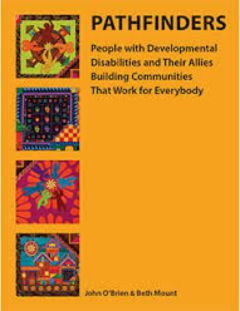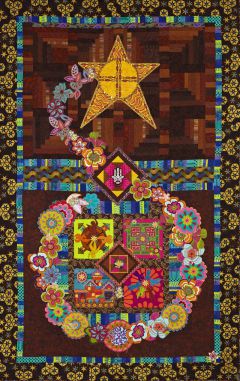David Towell reviews Pathfinders, the latest book by John O'Brien and Beth Mount published by Inclusion Press.
Authors: John O'Brien and Beth Mount
Reviewed by: David Towell
The Centre for Inclusive Futures defines its mission as 'developing sustainable communities that include everyone as equal citizens'. My friend Jackie and I have been long term allies in this work. Partly perhaps because of her own experience of segregation earlier in life,
Jackie shows remarkable empathy for the experience of others. We speak from time-to-time about how people we know, especially people with learning disabilities (the nearest UK translation of 'developmental disabilities') are getting on. We share the view that many here in the UK are swimming against a rising tide of disadvantage associated with growing inequality, cuts to public services, and the 'us and them' devaluation of minorities. What should we do? Jackie's answer is that we must stand alongside people at risk of disadvantage and keep at the work of building community together, only do it better! Pathfinders, sub-titled People with Developmental Disabilities and Their Allies Building Communities That Work Better for Everybody is an outstandingly useful resource for these continuing efforts. It's only February, but this is already my book of the year!

John is based in Atlanta, Georgia. I first invited him to come and help us here more than 35 years ago as we were developing the An Ordinary Life network: a national movement to bring people with learning disabilities (including my sister) out from institutions so that increasingly they would show up (to use John and Beth's words) in valued contributory roles in community places, where other citizens are typically to be found. Beth (now in New York) came a few years later to help us understand better how person-centred planning could be a genuinely radical approach to changing systems so that more people can live the lives they want.
Their collaboration with each other and support to networks in other countries (most recently in Europe, the multi-national New Paths to Inclusion programme) has continued both thoughtfully and energetically through these decades, John coming here once or twice every year since we first met and Beth mainly working close to the ground to facilitate further social innovation, for example the Harlem Urban Innovators described in the book.
Like all of us, John and Beth bring their own values to this work but they function essentially as facilitators. They help to bring different people - disabled people, family members, other allies, paid supporters, system managers, etc - together in ways which promote serious conversation. They enable participants to listen carefully to each other and think deeply about the situations they uncover. They try to promote better understanding of these situations and encourage people to invent new ways of doing things and take responsibility for actions, small and large, which make a positive difference. One aspect of this facilitation is reflecting back on what is emerging and capturing some of the learning in graphics or writing, for participants to use further. (For example, John has produced a series of books on how leaders in Dane County, Wisconsin, have worked to enable people with complex disabilities to be welcomed as full citizens, my favourite being Celebrating the Ordinary, Inclusion Press, 1998.)
In turn these reflections provide a means of sharing some of the ideas and inspirations more widely. In this new book, John and Beth have lovingly brought together much of the learning from these many years of practice into a single text, expressed in the form of useful thinking tools, many illuminating individual stories and a series of helpful summaries on ways of addressing key challenges. However, the book does not seek to offer 'solutions', beyond reporting what some impressive people and their allies have achieved in different situations. Rather, this is a book designed to inspire us all to continue our own journeys with others towards what (borrowing from Martin Luther King) they call 'creation of the beloved community'.
Let's start from the stories. When Harry Met Sally is a classic Hollywood version of the joys and struggles of building relationships. Famously it includes a restaurant scene with the punch-line 'I'll have what she's having!'. Unfortunately society has organised in ways which put multiple barriers in the way of many people, especially with more complex disabilities, getting anywhere close to what many others of us are having. But the stories of 'When Gail Met Ken', 'When Marcie Met André', 'When Audrey Met Ian' etc provide powerful accounts of what pathfinders (the people with disabilities) like Ken, André and Ian can achieve in their lives (and in ours) when:
John and Beth identify six elements in a simple and powerful logic which underpins these journeys of personal discovery (and around which the book is organised):
Simple logic but in practice a deeply creative process in which pathfinders and their allies are fully engaged in a joint endeavour to realise their highest purposes. Beth is a talented artist in the American tradition of quilt-making. The image below from the back cover of the book aspires to represent the spirit of this creativity in a different medium (Garden of Soul with thanks to Beth Mount).

However Pathfinders is not an easy read for the very best of reasons: many parts of the text, whether individual stories, particular graphics or detailed arguments, require intense reflection and the interrogation of how they relate to our own experiences, if we are to draw insights for better practice.
Let me illustrate this with three important examples.
Pathfinders is a book full of practical wisdom. It is a call to all of us to do whatever we can to greatly multiply the number of pathfinders making their own self-directed journeys to inclusion. Returning to Jackie's observations, I would add that we must also look to make common cause with others, for example who appreciate our need to live in better harmony with nature, in order to push back the rising tide of disadvantage so that these journeys can be pursued along a more gentle gradient.
The publisher is Inclusion Press 2015.
Pathfinders © John O'Brien and Beth Mount 2015.
Review: Pathfinders Review 2 © David Towell 2016.
All Rights Reserved. No part of this paper may be reproduced in any form without permission from the publisher except for the quotation of brief passages in reviews.
disability, education, Inclusion, intellectual disabilities, social care, Global, Reviews